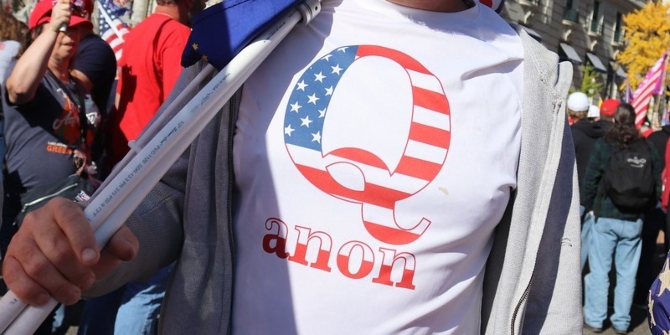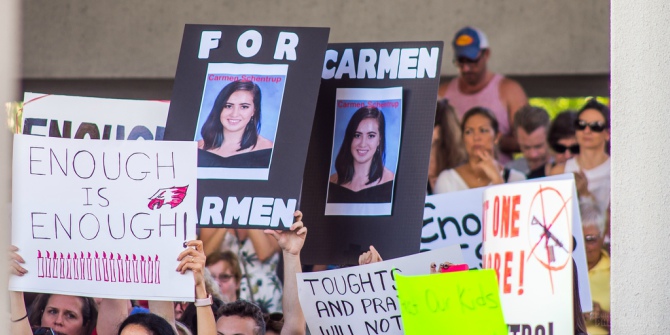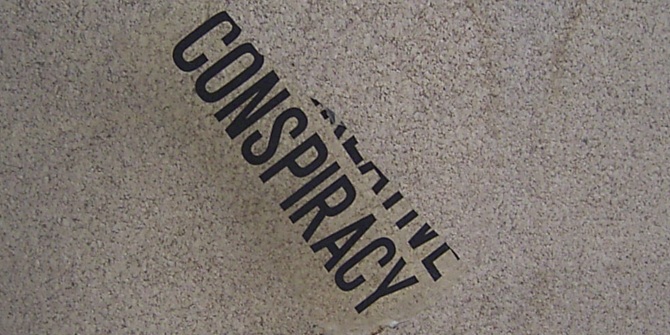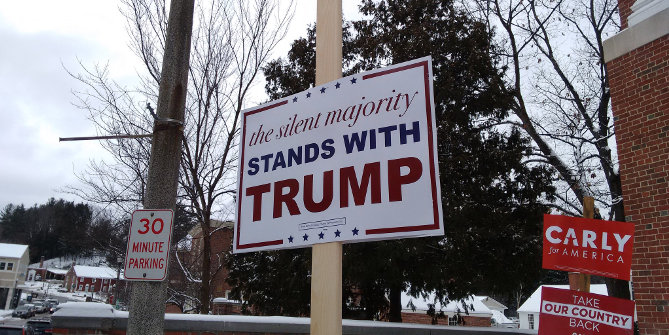 The popularity of Donald Trump in the 2016 race has also seen the elevation of conspiracy theories to the forefront of the public consciousness. Joseph E. Uscinski writes that while some amount of conspiracy theorizing will always be present in our politics, they now dominate all aspects of the 2016 campaign discourse. He argues that the prominence of conspiracy theories in this year’s election can be partly explained by the popularity of anti-establishment candidates like Donald Trump and Bernie Sanders, who have both engaged heavily in conspiracy theorizing during their campaigns.
The popularity of Donald Trump in the 2016 race has also seen the elevation of conspiracy theories to the forefront of the public consciousness. Joseph E. Uscinski writes that while some amount of conspiracy theorizing will always be present in our politics, they now dominate all aspects of the 2016 campaign discourse. He argues that the prominence of conspiracy theories in this year’s election can be partly explained by the popularity of anti-establishment candidates like Donald Trump and Bernie Sanders, who have both engaged heavily in conspiracy theorizing during their campaigns.
Conspiracy theories are unsubstantiated claims that might or might not be true. Regardless of their strained relationship with truth, they are a staple of politics. Polls suggest that all Americans believe at least one conspiracy theory; most people believe in a few. Presidential campaigns often elevate conspiracy theories in the public discourse because real things are at stake in elections. When there is a potential for loss, people will turn to conspiracy theories. This is in part because they want to avoid losing, and in part because they believe the other side is crooked enough to cheat.
Some amount of conspiracy theorizing will always be present in our politics, and all presidential elections feature conspiracy theories. In 2012, the then Senate Majority Leader Harry Reid claimed that Republican Presidential Candidate Mitt Romney didn’t pay taxes and was concealing that fact from an unsuspecting public. In 2008, many Republicans believed that Democratic Candidate Barack Obama was either secretly born in Africa, or hiding his Muslim faith. In 2004, many believed that President Bush played a role in the 9/11 terrorist attacks.
Usually, conspiracy theorizing is at a tolerable level and benign. But 2016 seems to make all previous presidential campaigns pale in comparison. Conspiracy rhetoric seemingly dominates most campaign discourse even though we have yet to reach the nominating conventions when most Americans start paying attention. Beyond their prominence, many of the conspiracy theories being discussed lack even a modicum of truth, and some, like Trump’s vaccine conspiracy theories, are downright dangerous.
What, or who, is to blame for this? Has the public become more conspiracy prone? Are Americans on the verge of a conspiracy panic? No, the best evidence suggests probably not: Americans in general have become less conspiracy-minded since the beginning of the Cold War.
A better explanation for America’s journey down the rabbit hole this campaign season might lay in the emergence of anti-establishment populist candidates, in particular Donald Trump and Bernie Sanders. That conspiracy rhetoric would emanate from these two contenders is to be expected – anti-establishment candidates have to have reasons for being against the establishment, and conspiracy theories fit the bill quite well. Both Trump and Sanders, have engaged heavily in conspiracy theorizing during their campaigns, and have appealed to groups who are prone to conspiracy theorizing. And, both confuse the established rules and their losses for rigged schemes that thwart popular will.
Trump has suggested a cover-up at San Bernardino, flirted with 9/11 conspiracy theories, proposed conspiracy theories about Syrian refugees, and accused Mexico of conspiring to ship murderers and rapists across our borders. His main claim to fame however was pushing the Birther theory in 2011.
Sanders’ campaign has been built on conspiracy theories about Wall Street and the one percent. The Vermont Senator has claimed the rich, whose greed “has no end,” have “rigged” the economy, and corrupted our politics. But, Sanders’ foray into conspiracy theories appears amateurish next to Trump’s deft and almost daily use of them. Trump’s salience in the media combined with his unabashed use of conspiracy narratives may account for the majority of the conspiracy rhetoric currently poisoning US politics and polluting American discourse.
Trump’s latest conspiracy theory is two-fold: that his now-vanquished presidential rival Ted Cruz’s father conspired in 1963 to assassinate President Kennedy and that the media conspired to cover up this fact. There is no evidence to back up either assertion and CNN was quick to admonish Trump for his accusations toward the media.
Before doing his best Oliver Stone imitation, Trump ranted this week about the “corrupt” and “crooked” Republican convention, which has yet to take place. This was also a conspiracy theory, and again, there is no evidence to suggest that the nominating process is either corrupt or crooked. Trump just didn’t like the possibility of losing. Buttressed by police officers supporting him, he backhandedly threatened the Republican establishment with violence if he didn’t win the nomination. This should come as no surprise: social scientists have shown that those who believe conspiracy theories are like to resort to Machiavellian tactics to thwart the conspiracy. Go figure: if shadowy powerful people are working in secret against you for evil purposes, then you need to fight fire with fire.
A new poll shows that Trump’s supporters are the most likely to believe in several conspiracy theories as well. They are most likely to have responded that the following conspiracy theories are “definitely true” or “possibly true”: that global warming is a fraud; that vaccines cause autism; and that Hillary Clinton knew about Benghazi in advance and allowed the attacks to occur.
Appealing to people’s cynicism and fears may be a short-term winning strategy for Trump, but there will be long term consequences for his presidency should he win. There is also a cost to democracy. Imagine a person who takes Trump’s rhetoric at face value: they would believe that the current president is a foreign usurper bent on bringing Islamic terrorism to the US, that a current senator’s father assassinated JFK, that doctors are covering up the link between vaccines and autism, and that Mexico is purposely sending its people here to murder and rape us.
Trump’s rhetoric creates what some social scientists describe as a vicious-cycle of cynicism. Just exposure to Trump’s conspiracy rhetoric could lead people to lose trust in government and other institutions writ large. This could in turn lead people to adopt more conspiracy theories.
And why wouldn’t they: According to Trump, everything is a conspiracy and everyone is in on it.
Please read our comments policy before commenting.
Note: This article gives the views of the author, and not the position of USAPP – American Politics and Policy, nor the London School of Economics.
Shortened URL for this post: http://bit.ly/23seuXs
_________________________________
 Joseph E. Uscinski – University of Miami
Joseph E. Uscinski – University of Miami
Joseph E. Uscinski is Associate Professor of Political Science in the College of Arts & Sciences, University of Miami. He is co-author of American Conspiracy Theories (Oxford University Press, 2014).







1 Comments